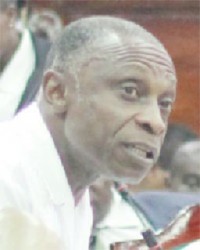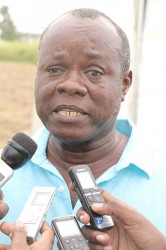-China policy comes under scrutiny
APNU’s spokesperson on financial matters Carl Greenidge says that the country’s assets are being allocated in an opaque manner to privileged foreign companies, benefitting a small group of nationals and a growing number of foreigners while the welfare of a large portion of the population stagnates.
Addressing the Cuffy 250 Committee’s second annual forum on the state of Afro-Guyanese in Guyana on Sunday at the Critchlow Labour College, Greenidge, who had served as Finance Minister during the PNC’s time in office, said that the choice of construction and infrastructure development projects is no longer determined by a plan that looks to develop manufacturing or mining. Instead, he argued, these are oriented towards the private sector, and assets are being allocated “primarily to a set of privileged foreigners, such as Chinese, Brazilian and Indian businesses,” because government feels it can control the beneficiaries of the large construction projects.
He said the largest chunk of the nation’s land resources has been allocated to these groups in recent times and it is given to those groups in circumstances that are less than transparent. “In other words, you would only find out by accident that they would have received those concessions and grants,” Greenidge said.


In this same vein, PNCR member and former lecturer of the University of Guyana Aubrey Norton said that there is a small group of ruling elites who are influencing the country’s foreign policy in a particular direction, which involves China. He charged that the government is comfortable with the private sector because it allows the corruption to flourish and it is not independent of the state.
Countries like the US and Canada have “good governance criteria” in place and according Norton it does not suit the government to go down that road and that is why China has been favoured.
Chronicling the financial history of the country over the years, Greenidge mentioned that there was an economic crisis which the PNC government attempted to reverse by introducing the Economic Recovery Programme (ERP) at the end of 1989. However, he said it had immediate consequences and immediately saw restriction on the assistance that was given to market agriculture produce, other than rice and sugar. Those who were most affected were Afro-Guyanese farmers, he noted. “This now became a problem area…. and a lot of people found themselves leaving the agriculture sector [and] we were unable to carry the infrastructural programmes we had into the villages…,” Greenidge said.
Those who benefited from the ERP were those who were able to take advantage of higher prices and move into areas of trading that afforded them the opportunity to take advantage of the preferential prices. As a result of the programme, Greenidge said that from 1991 to 1997 the country experienced an “unprecedented period of growth” that was faster than anywhere else in Latin America. At the same time, he added, the growth reversed a lot of the advantages and gains that were made subsequent to independence, particularly in the black community and especially in areas such as the public service.
According to Greenidge, from 1997 to 2005 the economic growth was 0.4%. He said the reason why from 2005 the growth seems to be so much more is due to the “re-basing” of the economy. “So a lot of the improvements that appear to be post-2006 have a lot to do with arithmetic than anything else…,” he stated, while adding that investment in this period has been focused on large projects.
He described the period as one of growing inequality in resources and added that while there are Afro-Guyanese who are involved in businesses and are wealthy, the bulk of both the Indo- and Afro-Guyanese communities have seen their welfare either stagnate or decline “compared to a small group of nationals and a growing group of foreigners who have been enjoying increases in incomes that have been enormous.”
He said one only has to go around Georgetown to see the impact of the inequality. He added that the skills industry is also affected as Afro-Guyanese men are doing less due to the declining number of males teaching but moreover because of discrimination in employment, resulting in a loss of interest.
“So, what I am saying here is that the economic policy in the post-2005 period is an economic policy that is geared not so much to building a human resource base that can take you into the third millennium but one that is geared to satisfying the need of a group that is running the country that sees its interest as control, exercising tight and expansive control over whatever [industries],” he said.
New proposals
In an attempt to reverse this situation, Greenidge said that at the community level Afro-Guyanese have to make their children and relatives aware of the importance of human capital, the knowledge economy and ensure that they know the government makes decisions that affects them and they need to intervene and monitor what is going on and when people are appropriating decision-making outside of their communities.
“We all have a role to play,” he charged.
Meanwhile, Norton suggested that Guyanese sit down and analyse the situation and come up with new proposals to deal with the country’s foreign policy.
He said that in recent times there has been a shift towards China and to understand this one needs to explore what is happening in the world.
He pointed out that at the international level, democratisation is taking place and that one of the results domestically is an emphasis on the need for good governance, transparency and accountability.
“All of these are concepts that the present government is afraid of…,” Norton stated, adding that in Guyana there is a small group of elites that is accumulating wealth at all costs.
He described this group as “parasites on the economy,” who are channelling the resources of the economy in a particular direction.
In the last days of Bharrat Jagdeo’s presidency, Norton said, there were a number of “backroom deals” which run counter to the democratisation process of the world.
“The government practices state control in a fashion through which they can accumulate the resources and so the foreign policy is running in that direction,” he said.
He said all of this has happened because the system is a one-party domination one as there is no mechanism for the opposition and others to impact on foreign policy, although he noted that it is a system that is not peculiar to the present government.
He called for the opposition to debate more papers in parliament, giving the government information on which direction they should go.
”In large measure what is required is a shift in the paradigm, an approach in which not only sectorial interests are satisfied but we develop a foreign policy system that covers the wide spectrum of Guyana and can benefit all of it, including the African Guyanese,” he added.










